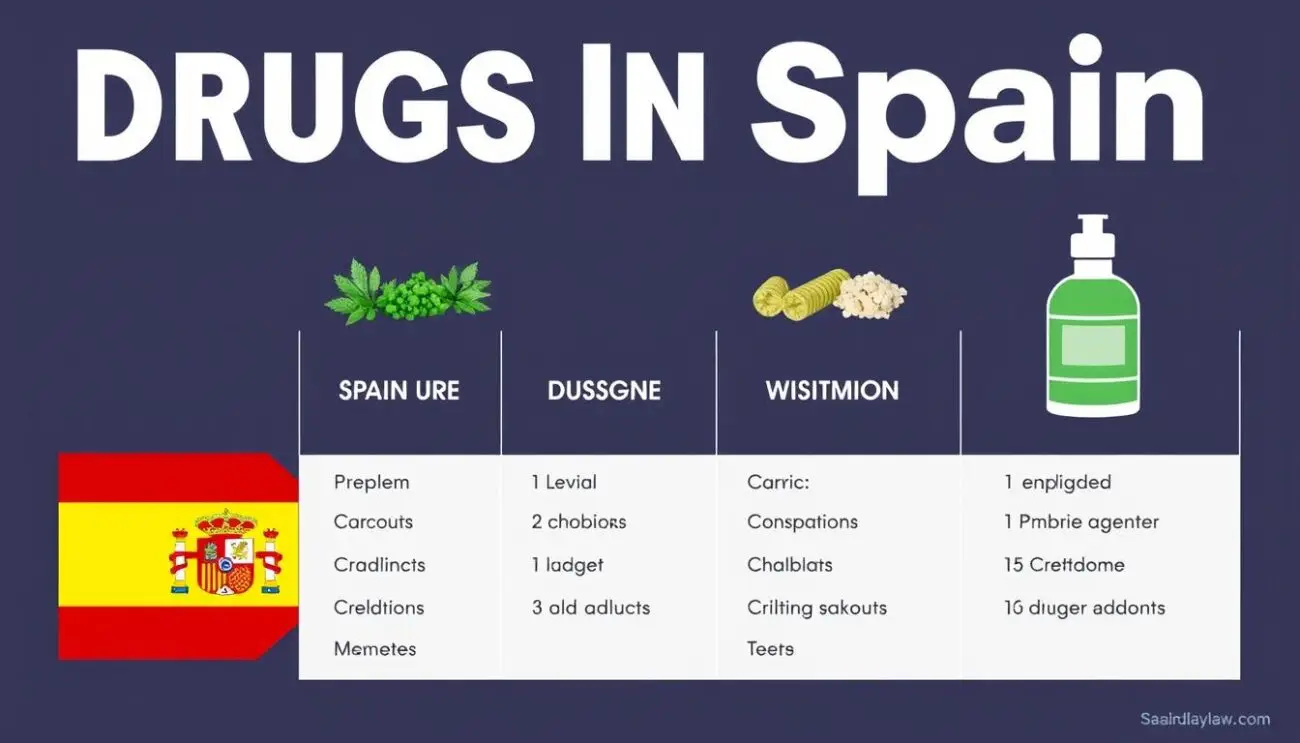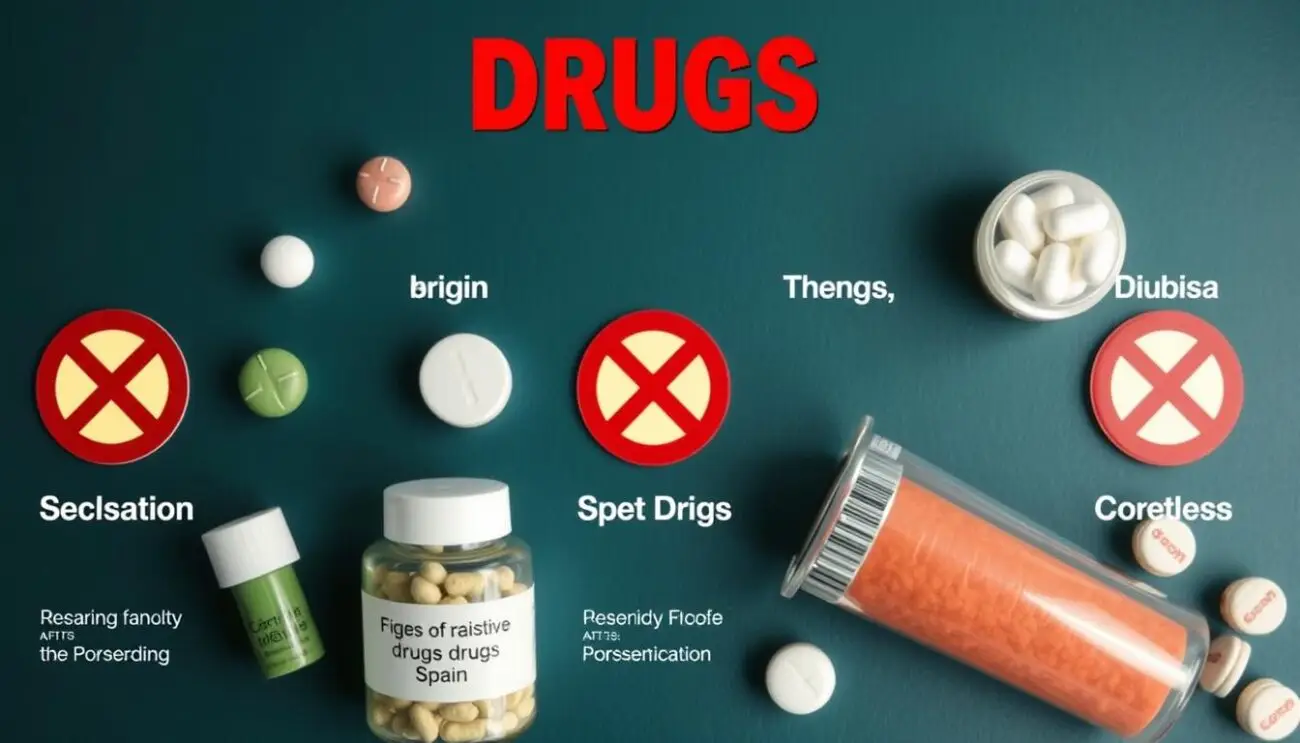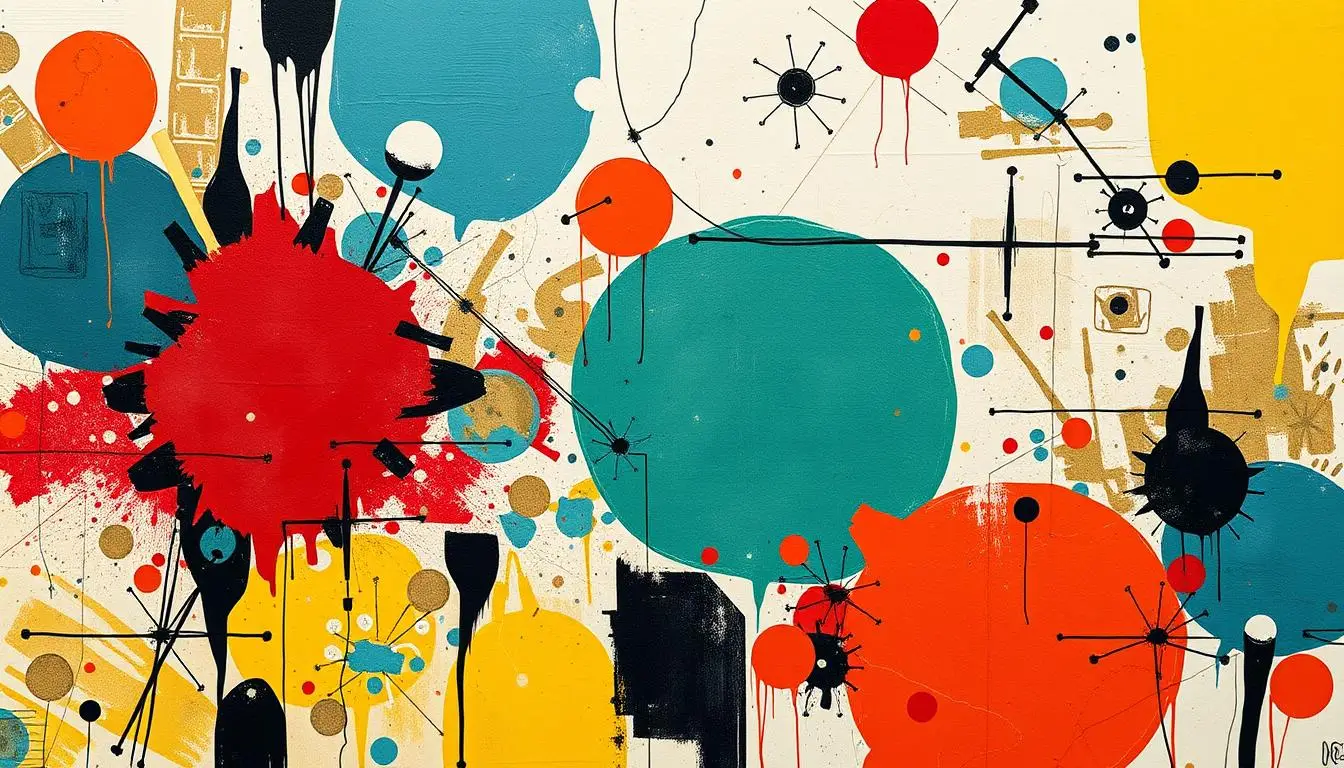Drug laws in Spain
Drug laws in Spain. Spain’s drug laws are complex, covering the use, possession, and trade of controlled substances. They aim to protect public health while respecting individual rights. This approach makes Spain’s drug policy stand out in Europe.
Over time, Spain has moved from harsh punishments to a health-focused approach. Now, having drugs for personal use is not a crime. Instead, the focus is on helping people recover and reducing harm.
Spain’s drug laws vary by drug type, amount, and purpose. For example, MDMA and heroin bring harsh penalties. But cannabis is treated more leniently.
Even though having drugs for personal use is not a crime, selling them is a big deal. Those caught can face big fines or even jail. The penalties get tougher if there are aggravating factors.
Key Takeaways
- Spain’s drug laws focus on harm reduction and treatment
- Personal possession and use are decriminalised
- Drug trafficking carries severe penalties
- Penalties vary based on drug type and quantity
- Spain’s approach balances public health and individual rights
- Regional autonomy plays a role in drug policy implementation
Overview of Spanish Drug Legislation
Spanish drug laws have changed a lot over time. They now aim to balance public health with individual rights. This makes Spain’s drug policy stand out in Europe.
Historical Context of Drug Laws in Spain
In the 1980s, Spain faced a heroin crisis. This led to a change in drug policies. The country moved towards harm reduction and drug policy reform in Spain.
Current Legal Framework for Drug Control
The core of Spanish drug legislation is the Organic Law 4/2015 on Citizen Security Protection. It, along with the Criminal Code, guides narcotics legislation in Spain. Under this, having drugs for personal use is not a crime but can lead to fines.
Recent stats show 8.6% of people aged 15 to 64 used cannabis in the past 30 days. 2.4% used cocaine in the last year. These numbers show the ongoing fight against substance abuse in Spain.
Key Government Bodies Involved in Drug Policy
Several government groups are key in shaping drug policies in Spain:
- National Plan on Drugs
- Spanish Observatory on Drugs and Addictions (OEDA)
- Ministry of Health, Social Services and Equality
These groups work together to create strategies for preventing, treating, and rehabilitating drug users.
| Drug Type | Lifetime Use (%) | Last 12 Months Use (%) | Last 30 Days Use (%) |
|---|---|---|---|
| Alcohol | 93.0 | 76.4 | 64.5 |
| Tobacco | 69.6 | 40.2 | 33.1 |
| Cannabis | 37.5 | 10.5 | 8.6 |
| Cocaine | 11.2 | 2.4 | 1.1 |

Drug Laws in Spain: Classification and Penalties
Spain sorts drugs by their danger to public health. The laws set out different penalties for each drug type and amount. This shows how complex Spain’s anti-drug laws are, tackling various drug crimes.
For high-risk drugs like MDMA, LSD, and heroin, the penalty is 3 to 6 years in prison for trafficking. But, for cannabis, the penalty is lighter, with 1 to 3 years in prison.

The Criminal Procedure Act of 2016, updated in October 2015, details drug crimes and their penalties. It’s key to Spain’s drug laws, guiding how cases move through court.
More severe cases get harsher sentences, while less serious ones get lighter penalties. This matches what other European countries do, like Finland and Bulgaria, which have special rules for dangerous drugs.
Spain’s laws also make a difference between having drugs for yourself and selling them. Like in other EU countries, having a bit of cannabis for personal use is often seen as a minor issue. It might get you an administrative fine, not a criminal charge.
Possession of Drugs for Personal Use
Spain has lenient drug possession laws compared to many countries. It has decriminalised small quantities of drugs for personal use. Instead of criminal charges, there are administrative sanctions.
Legal Limits for Personal Possession
In Spain, you can carry up to one minimum psychoactive dose of drugs for personal use. For example, the limits are:
- Marijuana: 10 mg (0.01 g)
- MDMA (Ecstasy): 20 mg (0.02 g)
- Heroin: 0.66 mg (0.00066 g)
Authorities look at the drug’s strength to decide on penalties. They aim to reduce harm and encourage personal use over trafficking.
Administrative Sanctions vs. Criminal Charges
Authorities check if someone is using drugs for personal or commercial reasons. They look at travel purpose, addiction status, money carried, packaging, and unusual addresses.
For small amounts, you might face fines, not criminal charges. This shows Spain’s focus on reducing harm and promoting health.
Fines and Potential Imprisonment
Carrying small amounts usually means fines. But, carrying more or planning to sell can lead to criminal charges and jail. The penalties depend on the drug and its amount.
Even with a lenient approach, drug possession is serious in Spain. It’s important for visitors and residents to know the drug laws in Spain to avoid legal trouble.
Drug Trafficking Laws and Consequences
Spain has tough drug trafficking laws. This is because it’s a key spot for drugs coming into the country. Its location makes it a strategic for drug trafficking.
High-risk drugs like heroin, cocaine, and MDMA get serious penalties. Trafficking these drugs can lead to 3 to 6 years in prison and big fines. But, for drugs like marijuana, the sentences are shorter, usually 1 to 3 years.
- Drug type and quantity
- Purity of the substance
- Offender’s role in the operation
- Presence of aggravating circumstances
Being part of organised crime or selling drugs to kids can make penalties worse. Trafficking large amounts or having other serious factors can also increase the sentence. But, if there are good reasons, the sentence might be less harsh.
| Drug Type | Minimum Psychoactive Dose | Typical Sentence Range |
|---|---|---|
| Cocaine | 50 milligrams | 3-6 years + fine |
| Heroin | 66 milligrams | 3-6 years + fine |
| Marijuana | 10 milligrams | 1-3 years + fine |
| MDMA | 20 milligrams | 3-6 years + fine |
Spain is making a big impact in fighting drug trafficking. In 2023, they seized more cocaine than ever before, almost doubling the year before. This shows Spain’s strong stance on drug trafficking and its role in European drug control.
Cannabis Regulations in Spain
Cannabis laws in Spain are complex. The country balances personal freedoms with public health. It’s important for both locals and visitors to understand these rules.
Legal Status of Cannabis
In Spain, cannabis is in a legal grey area. You can grow and use it in private, but selling or importing it is illegal. Showing or using it in public can result in fines of 601 to 30,000€.
Cannabis Social Clubs
Spain’s cannabis social clubs exist in a legal gap. These clubs grow cannabis for their members, who pay only for the costs. Barcelona is home to many, earning Spain a “new Amsterdam” reputation in cannabis culture.
Medical Cannabis Use
Medical cannabis in Spain is slowly becoming more accepted. Two medicines, Sativex and Epidyolex, are allowed for specific health issues. Sativex helps with spasticity in multiple sclerosis since 2010. Epidyolex, with cannabidiol, is for certain epilepsy types.
| Medicine | Approved Use | Year Authorised |
|---|---|---|
| Sativex | Multiple Sclerosis Spasticity | 2010 |
| Epidyolex | Epilepsy (Dravet and Lennox-Gastaut syndromes) | Recent |
Spain is moving forward with cannabis, but cautiously. It weighs the health benefits against misuse and public health risks.
Controlled Substances and Their Legal Status
Spain has a detailed approach to controlled substances. It classifies psychoactive substances by their risk to public health. This affects the legal actions for possession, use, and trafficking.
In Spain, narcotics are covered by “ORDEN 31 de julio de 1967”. Psychotropic substances are listed in “REAL DECRETO 2829/1977, de 6 de octubre”. This system helps control drugs in Spain better.
The Spanish law sees drug possession as a crime. But, having drugs for personal use usually leads to fines or community work, not jail. Spain also lets people grow up to two cannabis plants for their own use. But, selling, moving, or growing a lot is still illegal.
Spain splits drugs into “light” and “hard” types, like heroin or cocaine. Hard drugs get harsher penalties. This shows Spain’s effort to protect public health and respect individual rights.
“Both legal and healthcare professionals value alternative measures to imprisonment as useful tools to prevent offences related to drug use and support their broader application.”
A survey of 230 experts in law and health in Barcelona, Granada, and Bilbao showed mixed feelings about the addiction care system. But, many were unhappy with drug policies. Most Alternative Measures to Imprisonment in 2013 were for gender-based violence or other crimes, not drugs.
As Spain deals with controlled substances, the link between legal and health systems is key. It shapes policies and treatment methods.
Drug-Related Offences and Sentencing Guidelines
Spain balances public health with legal action on drug offenses. The justice system looks at many factors for drug crime sentences.
Factors Influencing Sentencing
Sentencing in Spain depends on the drug type and amount. For example, personal possession limits are set at 25g for cannabis resin, 100g for herbal cannabis, and 7.5g for cocaine. These rules help tell apart personal use from trafficking.
Aggravating and Attenuating Circumstances
Harsher sentences come with aggravating factors in Spain. These include:
- Supplying drugs to minors
- Involvement in organised crime
- Large-scale distribution
On the other hand, softer sentences might apply if it’s a first-time offence or if addiction was the main reason.
Repeat Offender Considerations
Spain is tough on repeat drug offenders. Getting caught with similar drug crimes within five years can double the sentence. This policy aims to stop criminals from reoffending and tackle ongoing crime.
| Drug Type | Personal Possession Limit | Supply Offense Threshold |
|---|---|---|
| Cannabis Resin | 25g | 2.5kg |
| Herbal Cannabis | 100g | 10kg |
| Cocaine | 7.5g | 750g |
| Heroin | 3g | 300g |
Spain’s drug laws are not as strict as some European countries but still take a firm stance on trafficking and repeat crimes. It’s important to know these rules if you’re dealing with drug-related crimes in Spain.
Substance Abuse Treatment and Rehabilitation Options
Spain has a wide range of drug rehabilitation and substance abuse treatment options. The National Strategy on Addictions 2017-2024, approved in February 2017, sets out the country’s plan to lessen harm from addictive substances and behaviours.
The Addictions Action Plan 2021-2024 aims to make society healthier by tackling substance use and behavioural addictions. This plan, backed by the Spanish Council for Drug Addiction and Other Addictions, shows Spain’s dedication to public health and global human rights agreements.
Drug rehabilitation in Spain offers many options tailored to each person’s needs. The Bridge, a well-known centre, provides customised care in private villas. Their programs use various therapy methods, like cognitive behavioural therapy and trauma therapy, to help with addiction recovery in Spain.
For those looking for substance abuse treatment in Spain, The Bridge offers both residential and dayhab programs. The residential program provides a structured setting for mental clarity and strength. The dayhab program helps individuals as they move towards independence.
Drug detoxification in Spain is a key first step in many treatment plans. The Bridge’s abstinence-based method aims to stop the addiction cycle and help clients understand why they abused substances. They also focus on family support and secondary care to aid long-term recovery and lower the chance of relapse.
With Spain expected to have the world’s highest life expectancy by 2040, its focus on detailed addiction treatment matches its dedication to public health.
Drink Driving and Drug Driving Laws
Spain has strict drink driving laws to keep roads safe. The limit for standard drivers is 0.5 milligrams per millilitre of blood alcohol. Novice and professional drivers can have a limit of 0.3 milligrams per millilitre.
Blood Alcohol Concentration Limits
Going over these limits can result in serious outcomes. If a breathalyser test shows more than 0.60 milligrams per litre, criminal action may start. Fines begin at 500 euros for levels above 0.25 milligrams per litre. For those caught again within a year, the fine doubles to 1,000 euros.
Penalties for Drink Driving
The consequences for drink driving in Spain are tough:
- Driving licence suspension for 1-4 years
- Prison sentences of 3-6 months
- Community service orders for 31-90 days
- Fines ranging from 1,000 to 3,000 euros
Refusing a breathalyser test is also an offence. It can lead to 6-12 months in prison and a 1-4 year ban on driving.
Drug Testing Procedures
Drug driving in Spain is taken very seriously. Roadside tests are used to check for drugs. In 2019, the Civil Guard checked 6.5 million drivers for drink-driving, up from the year before.
A 2018 study found 12% of Spanish drivers had used illegal drugs or alcohol recently. The government wants to cut drink-driving incidents to under 1% in checks.
| Driver Category | Blood Alcohol Limit | Minimum Fine |
|---|---|---|
| Standard Drivers | 0.5 g/L | €500 |
| Novice/Professional Drivers | 0.3 g/L | €500 |
| Criminal Proceedings | >0.60 g/L | €1,000 – €3,000 |
International Comparison: Spanish Drug Laws vs. Other Countries
Spain’s drug laws stand out when compared to many other countries. They show a unique approach to handling drugs globally. Spain is known for its liberal stance on personal drug use and possession.
In Europe, drug laws vary a lot. Spain is close to Portugal and the Netherlands in how it doesn’t criminalise personal drug use. This is very different from the strict rules in places like Sweden and France.
Looking at drug policies around the world, we see some interesting differences:
| Country/Region | Personal Use Policy | Trafficking Penalties |
|---|---|---|
| Spain | Decriminalised | Strict |
| Portugal | Decriminalised | Moderate |
| Netherlands | Tolerated | Moderate |
| Sweden | Criminalised | Very Strict |
| USA | Varies by State | Very Strict |
Spain’s drug laws are balanced within European drug policies. They are lenient on personal use but strict on drug trafficking. This shows Spain’s focus on public health and safety in drug policy.
Recent Developments and Potential Future Changes in Drug Policy
Spain’s drug policy is changing fast. The country is moving towards legalising cannabis, which is a big topic of debate. There’s a growing support for reforming drug laws, especially for cannabis and medical use.
In 2019, Spain saw a lot of drug activity. Authorities found 1.5 million marijuana plants, 38 tons of cocaine, and 350 tons of hashish. That year, there were 20,437 drug trafficking arrests, 12.3% more than before. These numbers show the need for a new approach to drug policy.
The cannabis industry is changing too. Over the last ten years, the THC level in cannabis resin has doubled, reaching 22.8% in 2022. This has led to talks about the importance of regulated markets for safe and quality products.
“The evolving drug landscape necessitates a reevaluation of our current policies. We must adapt to address new challenges while prioritising public health and safety.”
There’s a growing idea of decriminalising drugs in Spain. Supporters believe it could ease the load on courts and free up funds for treatment and reducing harm programs.
| Year | Cocaine Seizures (tonnes) | Cannabis Plants Seised |
|---|---|---|
| 2019 | 38 | 1,500,000 |
| 2022 | 58.3 | Data not available |
| 2023 | 9.5 (largest single seizure) | Data not available |
As Spain deals with drug issues, policymakers are looking at new ways to tackle them. The future might bring big changes in how Spain handles drug use, trafficking, and social problems.
Impact of Drug Laws on Tourism in Spain
Spain’s drug laws greatly affect its tourism. The country is quite open about some drugs, like cannabis. This has led to a special kind of tourism. But, it’s important for tourists to know that using or having drugs is still illegal in Spain.
Cannabis tourism in Spain, especially in Catalonia, is getting more popular. This region is famous for its cannabis clubs. These clubs draw in visitors who want to learn about Spain’s cannabis scene. It’s key for tourists to understand the complex drug laws in Spain.
These laws have many effects on tourism. Some places make money from cannabis tourism, but others struggle with public drug use and social problems. To tackle these issues, Spain has set up different rules:
- Fines for public indecency in places like Malaga
- Penalties for loud noise up to €30,000
- Rules on drinks in all-inclusive hotels to six per day
These rules help keep tourism and public safety in balance. Visitors should learn about the local laws and customs to stay out of trouble in Spain.
| Aspect | Details |
|---|---|
| Cannabis possession | Decriminalised for personal use |
| THC threshold for CBD products | 0.3% maximum |
| Personal cannabis cultivation | Legal since 2015 if not visible in public |
| CBD product import | Legal with less than 0.3% THC |
Legal Rights and Procedures for Drug-Related Arrests
It’s important to know about drug arrest procedures in Spain if you’re facing charges. The Spanish legal system has certain rights and strict rules to ensure fair treatment for those accused of drug crimes.
Right to Legal Representation
In Spain, if you’re arrested for a drug offence, you have the right to a lawyer. It’s crucial to find a solicitor who knows Spanish drug laws well. Fair Trials International, a charity, gives advice and helps connect people with local lawyers to understand the Spanish legal system.
Search and Seizure Protocols
Search and seizure in Spain follow strict rules to make sure evidence is allowed in court. The legal system here is inquisitorial, meaning an investigative judge is key in preparing the case. This is different from the UK and USA’s adversarial systems.
Court Proceedings for Drug Offences
Court cases for drug crimes in Spain depend on the seriousness of the charge. The Criminal Code sets prison terms for drug trafficking from 3 to 9 years. Spain doesn’t have plea bargaining. The prosecution must prove guilt beyond doubt.
| Offence Category | Description | Potential Penalties |
|---|---|---|
| Low-risk drug trafficking | Involving small amounts of drugs | Fines, shorter imprisonment |
| High-risk drug trafficking | Involving large amounts or dangerous substances | Longer imprisonment, hefty fines |
Since 2009, Spain has had a National Drug Strategy focusing on a humanitarian approach. It aims to lessen the harm of drug abuse on society and health, covering both legal and illegal drugs.
Conclusion
Spain’s drug laws show a careful balance between health and justice. The Spanish drug policy summary tells us about a changing strategy. It has moved from strict rules to focusing on personal use while keeping tough laws for drug trafficking.
Spain’s drug control focuses on reducing harm. This is seen in the growth of cannabis clubs, with more than 500 across the country. These clubs, especially in Catalonia and the Basque Country, follow strict rules and get local approval. This makes them more accepted.
Spain’s drug laws have changed with new drug use and trafficking patterns. In recent years, there have been more anti-drug efforts, like big seizures at Barcelona ports. The National Police in Valencia have been key, taking down drug networks and arresting people. This shows the challenges in controlling drugs in Spain.
As discussions on drug policy go on, Spain’s laws might change more. The current mix of health care and police work shows a forward-thinking approach in Europe. Future changes could come from new studies on drug use and addiction, and how different substances affect our minds. This shows how complex making good drug laws in Spain can be.


